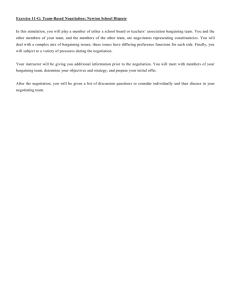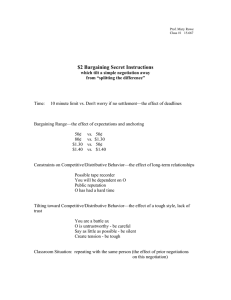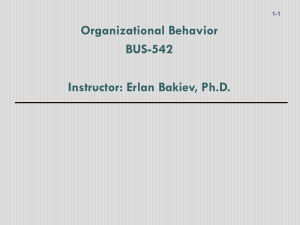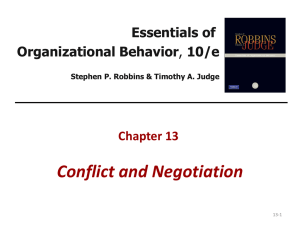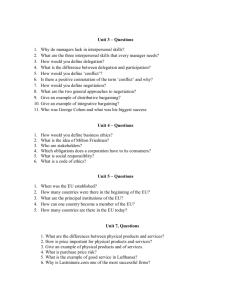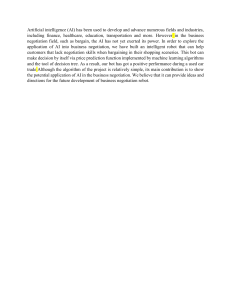Managing Conflicts & Negotiation: Organizational Behavior
advertisement
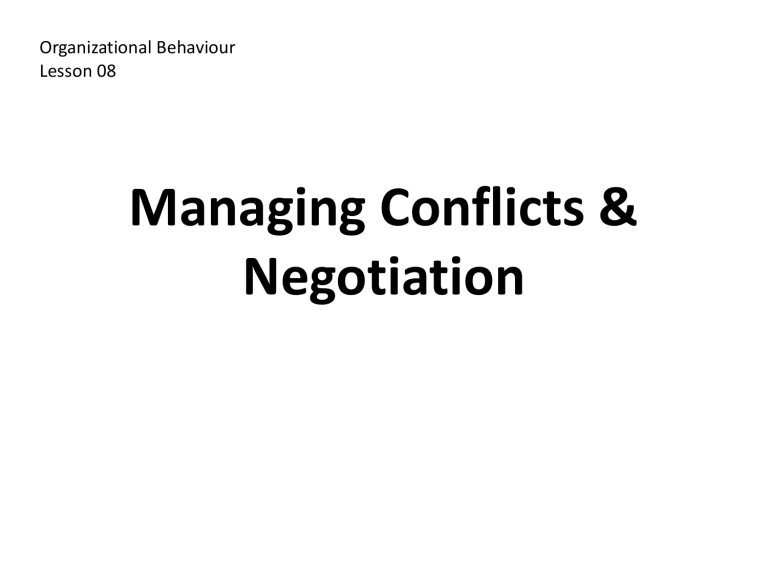
Organizational Behaviour Lesson 08 Managing Conflicts & Negotiation Objectives of the Lesson • • • • • • Define Conflict Explain different views of conflict Discuss the conflict process Define negotiation Contrast distributive and integrative bargaining Examine the roles and functions of third party negotiations • Discuss the steps of the negotiation process 2 What is a Conflict? • A process that begins when one party perceives that another party has negatively affected, or is about to negatively affect, something that the first party cares about (Robbins et al, 2015) 3 Transitions in Conflict Thought • The Traditional View of Conflict – The belief that all conflict is harmful and must be avoided – Viewed as violence, destruction and irrationality to reinforce its negative connection • Human Relations View of Conflict – The belief that conflict is a natural and inevitable outcome in any group 4 Transitions in Conflict Thought Cont’d • The Interactionist View of Conflict – The belief that conflict is not only a positive force in a group but that it is absolutely necessary for a group to perform effectively – Encourages conflict on the grounds of harmonious, peaceful, tranquil and corporative – All conflicts are good? 5 Transitions in Conflict Thought Cont’d • Resolution Focused View of Conflict – The belief that conflict is inevitable in most organizations and it focuses more on productive conflict resolution 6 Functional Vs Dysfunctional Conflicts • Functional Conflict – Conflict that supports the goals of the group and improves its performance • Dysfunctional Conflict – Conflict that hinders group performance 7 Types of Conflict • Task Conflict – Conflicts over content and goals of the work • Ex:…………………………………………………………………….. • Relationship Conflict – Conflict based on interpersonal relationships • Ex:…………………………………………………………………….. • Process Conflict – Conflict over how work gets done • Ex:…………………………………………………………………….. 8 What Researches Say? • Relationship conflicts are almost always dysfunctional? – The most psychologically exhausting to individuals – Why? • ………………………………………………………………………… – Be careful when providing feedback to others! – Teams made up of individuals who are, on average, high in openness and emotional stability are better able to turn task conflict into increased group performance 9 Loci of Conflict • Dyadic conflict • ……………………………………………………. • Ex:…………………………………………………………………….. • Intragroup conflict • ……………………………………………………. • Ex:…………………………………………………………………….. • Intergroup conflict • ……………………………………………………. 10 • Ex:…………………………………………………………………….. The Conflict Process (Source: Robbins et al, 2015) 11 Stage I : Potential Opposition or Incompatibility • Communication – Semantic difficulties, misunderstandings, jargon, and ‘noise’ • Structure – Size of the group, degree of member-goal compatibility, leadership style, reward systems and degree of dependence between groups • Personal Variables – Personality, emotions and values 12 Stage II: Cognition & Personalization • Perceived Conflict – Awareness by one or more parties of the existence of conditions that create opportunities for conflict to arise • Felt Conflict – Emotional involvement in a conflict creating anxiety, tenseness, frustration, or hostility 13 Stage III: Intentions • Decisions to act in a given way 14 Stage III: Intentions Cont’d • Cooperativeness: Attempting to satisfy the other party’s concerns • Assertiveness: Attempting to satisfy one’s own concerns 15 Stage III: Intentions Cont’d • Competing – A desire to satisfy one’s interests, regardless of the impact on the other party to the conflict • Collaborating – A situation in which the parties to a conflict each desire to satisfy fully the concerns of all parties • Avoiding – The desire to withdraw from or suppress a conflict 16 Stage III: Intentions Cont’d • Accommodating – The willingness of one party in a conflict to place the opponent’s interests above his or her own • Compromising – A situation in which each party to a conflict is willing to give up something 17 Stage IV: Behaviour • Conflicts become visible • Conflict Management – The use of resolution and stimulation techniques to achieve the desired level of conflict 18 Stage IV: Behaviour (Conflict-Intensity Continuum) 19 Stage V: Outcomes • Functional Outcomes – – – – – ………………………………………………….. ………………………………………………….. ………………………………………………….. ………………………………………………….. ………………………………………………….. • Dysfunctional Outcomes – – – – – ………………………………………………….. ………………………………………………….. ………………………………………………….. ………………………………………………….. ………………………………………………….. 20 21 Negotiation • A process in which two or more parties attempt to reach acceptable agreement in a situation characterized by some level of disagreement • A process that occurs when two or more parties decide how to allocate scare resources • BATNA: The Best Alternative To a Negotiated Agreement; the lowest acceptable value (outcome) to an individual for a negotiated agreement 22 23 Bargaining Strategies • Distributive Bargaining – Negotiation that seeks to divide up a fixed amount of resources; a win-lose situation • Integrative Bargaining – Negotiation that seeks one or more settlements that can create a win-win solution 24 Bargaining Strategies Cont’d (Source: Robbins et al, 2015) 25 Third-Party Negotiations • Mediator – A neutral third party who facilitates a negotiated solution by using reasoning, persuasion, and suggestions for alternatives • Arbitrator – A third party to a negotiation who has the authority to dictate an agreement 26 Third-Party Negotiations Cont’d • Conciliator – A trusted third party who provides an informal communication link between the negotiator and the opponent • Consultant – An impartial third party, skilled in conflict management, who attempts to facilitate creative problem solving through communication and analysis 27 For Discussion Class! • Explain the conflict process by using your own experience. • Discuss the steps of the negotiation process. • Examine how individual differences influence negotiation. 28
